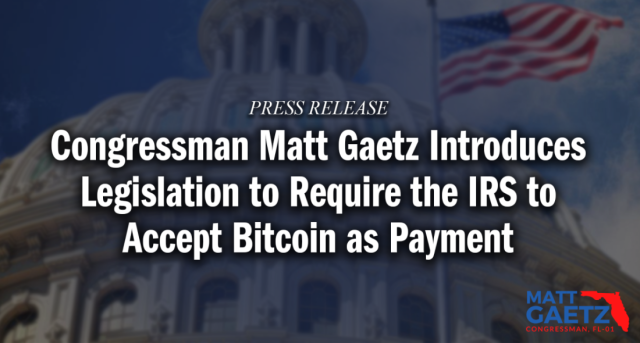Florida Congressman Matt Gaetz has sparked a new debate about the intersection of cryptocurrency and traditional finance. This week, Gaetz presented a bill proposing Bitcoin (BTC) as a legitimate payment method for federal income taxes in the United States. The proposal aims to usher in a new era of tax efficiency and technological leadership for the nation.
Can Bitcoin handle the US tax bill?
Gaetz, a Republican and staunch supporter of cryptocurrencies, sees Bitcoin as a catalyst for a more streamlined tax system. He argues that the integration of Bitcoin promotes innovation and positions the United States at the forefront of technological progress.

However, experts warn against hasty adoption. Bitcoin’s notorious price volatility could introduce significant uncertainty into the tax payment process. Imagine you owe $10,000 in taxes today, but by the time your Bitcoin transaction settles, the equivalent value could be much higher or lower. This volatility could create headaches for both taxpayers and the Internal Revenue Service (IRS).
Challenges beyond volatility
Safety is another major concern. Cryptocurrency transactions, although benefiting from a decentralized and transparent ledger, are not immune to cyberattacks. Malicious actors could potentially exploit the vulnerabilities to disrupt tax payments or even steal funds.
The IRS should implement robust security protocols to handle large-scale Bitcoin transactions. Additionally, the current infrastructure may not be equipped for such a radical change. Integrating Bitcoin into the existing tax filing system would require significant investment and development to ensure smooth processing and record-keeping.
Crypto Regulations and Stablecoin Alternatives
Despite the challenges, Gaetz’s proposal serves as a timely reminder of the changing financial landscape. Cryptocurrency is here to stay, and governments around the world are grappling with how to regulate and integrate it. The recently passed Financial Innovation and Technology for the 21st Century Act (FIT 21) aims to establish a clearer regulatory framework for cryptocurrencies in the United States.
This would provide much-needed clarity and stability for both businesses and consumers. Additionally, lawmakers are exploring the potential of stablecoins, cryptocurrencies tied to the value of traditional assets like the U.S. dollar. Stablecoins offer the benefits of crypto transactions, such as faster settlement times and potentially lower fees, without the price fluctuations associated with Bitcoin.
El Salvador’s Bold Experiment: An Ongoing Case Study
One country has already taken the plunge in adopting Bitcoin: El Salvador. In 2021, El Salvador became the first country in the world to make Bitcoin legal tender. Although this decision has drawn both praise and criticism, it represents a concrete experience from which the United States can learn.
Featured image from Shutterstock, chart from TradingView


